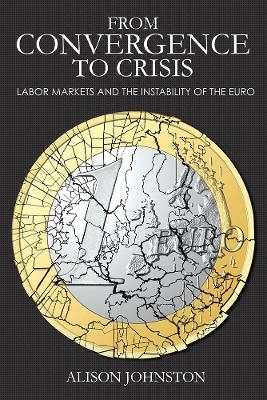
From Convergence to Crisis
Cornell University Press (Verlag)
978-1-5017-0265-5 (ISBN)
- Lieferbar (Termin unbekannt)
- Versandkostenfrei innerhalb Deutschlands
- Auch auf Rechnung
- Verfügbarkeit in der Filiale vor Ort prüfen
- Artikel merken
What explains Eurozone member-states’ divergent exposure to Europe’s sovereign debt crisis? Deviating from current fiscal and financial views, From Convergence to Crisis focuses on labor markets in a narrative that distinguishes the winners from the losers in the euro crisis. Alison Johnston argues that Europe’s monetary union was structured in a way that advantaged the corporatist labor markets of its northern economies in external trade and financial lending. Northern Europe’s distinct economic advantage lay not with its fiscal capabilities, which were not that different from those of southern Eurozone countries, but with its wage-setting institutions. Through highly coordinated collective bargaining, the euro North persistently undercut the inflation performance of southern trading partners, destining them to a perpetual cycle of competitive decline and external borrowing. While northern Europe’s corporatist labor markets were always low inflation performers, monetary union ultimately made their wage-setting institutions toxic for the South.
The euro’s institutional predecessor, the European Monetary System, included economic and institutional mechanisms that facilitated macroeconomic adjustment and convergence between the common currency’s corporatist and noncorporatist economies. Combining cross-national statistical analysis with detailed qualitative case studies of Denmark, Germany, Italy, Ireland, the Netherlands, and Spain, Johnston reveals that monetary union’s removal of these mechanisms allowed external imbalances between these two blocs to grow unchecked, underpinning the crisis in which Europe currently finds itself. Rather than achieving the EU’s goal of an ever-closer union, the common currency produced a monetary environment that destabilized the economic integration of its diverse labor markets.
Alison Johnston is Assistant Professor of Political Science and Public Policy at Oregon State University.
1. Incomplete Monetary Union and Europe's Current Crisis
2. From Order to Disorder: How Monetary Union Changed National Labor Markets
3. Monetary Regimes, Wage Bargaining, and the Current Account Crisis in the EMU South: Empirical Evidence
4. National Central Banks and Inflation Convergence: Danish and Dutch Corporatism Inside and Outside of Monetary Union
5. Strength in Rigidity: Public Sector Employment Reform and Wage Suppression in Germany, the Netherlands and Italy
6. Sheltered Sector Dominance under a Common Currency: Irrational Exuberance in Ireland and Fragmentation in Spain
7. EMU, the Politics of Wage Inflation, and Crisis: Implications for Current Debates and Policy
| Erscheinungsdatum | 08.06.2016 |
|---|---|
| Reihe/Serie | Cornell Studies in Money |
| Zusatzinfo | 8 Tables, unspecified |
| Verlagsort | Ithaca |
| Sprache | englisch |
| Maße | 152 x 229 mm |
| Gewicht | 454 g |
| Themenwelt | Sozialwissenschaften ► Politik / Verwaltung ► Politische Theorie |
| Wirtschaft ► Volkswirtschaftslehre ► Finanzwissenschaft | |
| Wirtschaft ► Volkswirtschaftslehre ► Makroökonomie | |
| ISBN-10 | 1-5017-0265-3 / 1501702653 |
| ISBN-13 | 978-1-5017-0265-5 / 9781501702655 |
| Zustand | Neuware |
| Informationen gemäß Produktsicherheitsverordnung (GPSR) | |
| Haben Sie eine Frage zum Produkt? |
aus dem Bereich


